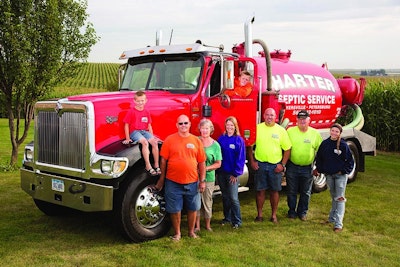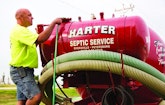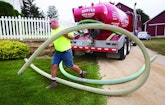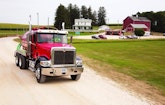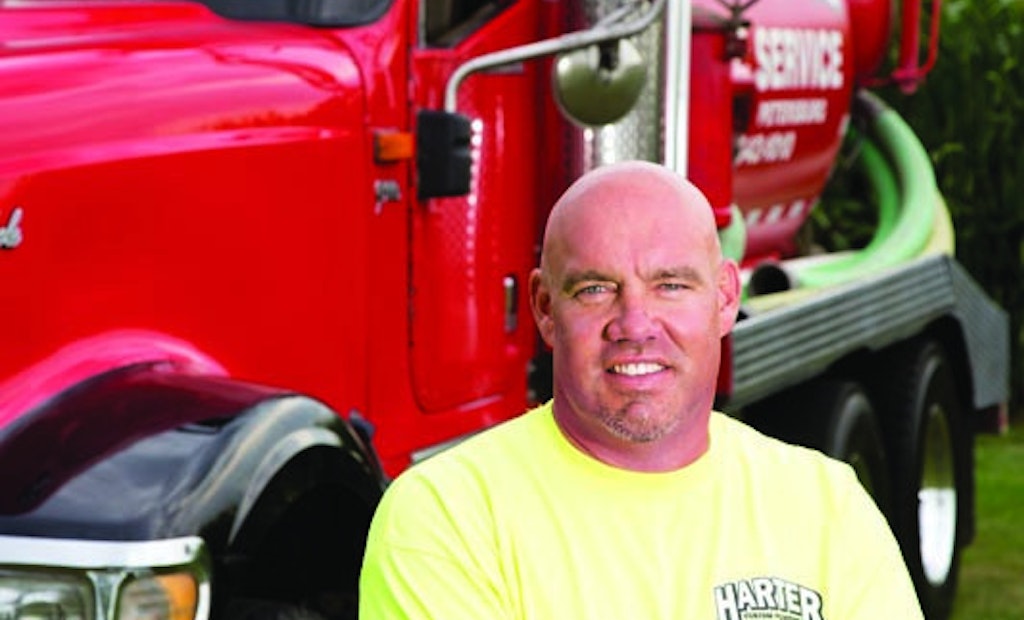
Interested in Trucks?
Get Trucks articles, news and videos right in your inbox! Sign up now.
Trucks + Get AlertsWorking in rural northeast Iowa, Robb Harter started his liquid-waste-hauling business based on serving the diverse needs of his many farmer neighbors. As long as the work involved conveying sludge or wastewater, he would be ready to perform.
Starting right out of high school in 1988 with a single piece of equipment – a manure spreader – Harter has grown to provide a menu of services that includes everything from pumping septic tanks to video sewer line inspections to installing residential onsite systems. Harter Custom Pumping is on solid footing because he understands the needs of small, rural communities and has become an expert at effectively operating a vast collection of pumping industry tools.
SEASONAL SERVICES
Harter will tell you that business success in lightly populated Dyersville, Iowa, depends on keeping customers happy and never ignoring a service they need.
Spring and early fall are the busiest seasons. Within 10 miles of his shop are about 2,000 cows and about 6,000 hogs. In the spring this means moving about 27 million gallons of waste as farmers clean the winter accumulation from their storage pits. There’s some manure hauling through the summer to feed hay fields but most of the work comes in the fall: Moving 65 to 70 million gallons of waste as farmers prepare fields for the next year’s crop.
Throughout the warmer months he also works for area municipalities. Each year these communities need sludge removed from their lagoons. If the sludge has a high concentration of solids, Harter has to move it to nearby farm fields with trucks. If the sludge quality allows, he’ll use his injection equipment and pump directly from a storage lagoon to a nearby field. At 1,800 gpm it’s much faster than lifting and hauling. Harter also has a jetter truck and cleans sewers for small towns.
There is continuing maintenance work on municipal systems and Harter also installs onsite systems. These are standard septic tank and drainfields, no drip irrigation or ATUs. The schedule of onsite work depends on demand and availability of a part-time workforce. As for pumping, the vacuum truck never stops moving at any time of year.
One factor that helps smooth out spikes in his workload is the local watershed protection program. Through this initiative local farmers can receive grants to expand their waste storage capacity. As a result of increased farm storage, Harter has almost no emergency calls from desperate customers with overflowing waste lagoons.
A GRADUATION PRESENT
Harter got his start because of his father and his own initiative. His dad, Joe, gave Harter and each of his siblings $3,000 when they graduated from high school. The others bought cars. Harter bought a manure spreader and started custom hauling. He worked full time in a factory and hauled waste on the side. Gradually the side business became his main occupation.
As demand grew he added a truck and then another. Septic service came into the picture when someone he knew complained about the price charged by another contractor. “I bought an old septic truck, used it for six months and found a lot of people wanted this job done. I got into everything because of the demand behind it,” Harter says. People liked his work and asked him about other services they needed. And the business grew.
That does not mean it was an easy start. Harter had no established territory at first. During his early years in business Harter drove a lot of miles and made a lot of cold calls to find people who needed his services. That led to one of his memorable jobs cleaning a digester at a wastewater plant in Freeport, Ill.
“There was a 6-foot hairball in that digester. At first we thought we’d just cut it up. We tried chainsaws, but they couldn’t touch the darn thing,’’ he says, explaining the challenge. “We finally brought in a crane to hoist it out, put it on a truck and take it to the landfill.”
OWNER/OPERATOR IS KEY
Yet for all the services he has added, Harter is limiting the size of his business. He reached the point where he was comfortable with the size of his operation and he stopped trying to add workers and expand territory.
“Could I get five times bigger? Yeah, but I’d need 10 good guys, and good help is really hard to find,” he says. “I’m the owner and the operator, and that counts for something with customers.”
The employees he has are people he can trust to do good work. One is his dad, who worked for the toy company Ertl for 40 years until it shifted production to Mexico and would take vacations in the fall to help Harter at peak business time. There are two younger guys, and two others are retired farmers.
“You can’t find better help than retired farmers,” Harter says. They know machinery, know farms and wastewater, and understand hard work. One employee was a septic service customer who sold his dairy farm. Another had retired from farming and gone to work in a factory but preferred the outside wastewater work.
Harter says he keeps his workers through even-keeled supervision and treating them well. “I’m not a screamer or a yeller. I never fly off the handle. I won’t ask any of my employees to do something I wouldn’t do myself. You have to respect people, treat them the way you want to be treated,” Harter says.
MATCHING EQUIPMENT AND WORKLOAD
Harter sees a big demand for pipe bursting in older towns where the infrastructure is old, but that does not mean all towns. In small towns digging is still cheaper because there are few streets to break up. But even in a city like Dubuque, Iowa, with a population of about 58,000, digging is too expensive, he says.
He applied similar thinking to his purchase of a jetter truck. Cities with several thousand people have enough demand to keep one of these trucks working and can justify the cost of purchase. That is not the case in Harter’s part of Iowa. Dyersville has fewer than 5,000 people, and nearby communities are smaller. They’re nice places and doing well, but none is large enough by itself to justify buying and keeping a quarter-million-dollar piece of equipment.
Providing a variety of services requires a wide variety of equipment. For moving waste from agricultural systems, Harter has five trucks with float tires so they can move waste into fields. He started with vehicles that had done duty as cement mixers. These are tandem-axle Freightliners or Internationals built between 1991 and 2006. All have Husky steel tanks, and Harter did the building himself.
His septic service truck is a 2006 International 9100 with a Jurop/Chandler pump and a 3,000-gallon steel tank, which he also built himself.
His sewer-jetting truck is built on an International chassis and has a Myers water pump and Roots blower (GE Energy) that produces 2,500 psi at 80 gpm. It has a 3,000-gallon galvanized steel tank. In addition Harter has two trailer-mounted jetters, both from Mi-T-M, producing 5,000 psi at 5 gpm. He also has an assortment of cameras from Aries Industries Inc. and SecureSight.
Another big equipment investment is his waste injection rig. That’s from Hydro Engineering with a Pioneer pump driven by a John Deere engine. With that is 3 miles of hose from Angus Flexible Pipelines. He has his own Case IH tractor that moves from job to job and pulls the injection implement across fields.
MAINTAINING LOCAL FOCUS
Harter’s growth-limiting strategy means sometimes turning down work. “If a guy calls me from 50 miles away and wants me to do some work for him, I’ll turn him down. I’ve got my regular farmer customers and I treat them as well as I can,” Harter says. “I can’t have every customer in Iowa. I don’t need them all, but I still want all the ones in my backyard.”
The focus on local customers and personal service has paid off. In some cases Harter now works for a second generation. Children who crawled into his truck now own their parents’ farms and have kept Harter on to take care of their wastewater needs.
Time and hard work have brought Harter to a comfortable point with his business. He’s not chasing to raise his pumping volume every year. He can fit a special or complex job into the schedule by being efficient. It is what he thinks about all the time, what he reminds his employees of and what he achieves because he has good workers.
“My dad always told me, ‘If you can’t make enough money while the sun is up, maybe you need a different job.’” Harter doesn’t want a different job. He works to have good customer satisfaction, takes care of his workers and as a result he has a good business — and that is enough for him.
